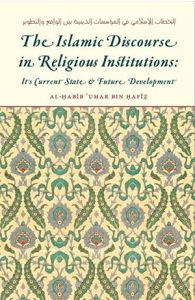The Islamic Discourse in Religious Institutions: Its Current State & Future Development

Author: Al-Ḥabīb ‘Umar bin Ḥafīẓ
Translator: Amjad Tarsin
Publisher: Al-Maqasid
Year of Publication: 2020
Print Length: 96 pages
Genre: Islamic Studies / Da’wah & Applied Science; Theology, Ethics and Philosophy; Non-Fiction / Religious Studies, Social Science
Topic: Islam, Governance, Ethics & Morality, Religious Thoughts & Philosophy, Religious Institution, Scholarship & Knowledge
Allah the Exalted said, “Let there be a group among you who call to goodness, encourage what is good, forbid what is evil; it is they who are successful.” – [Quran 3:104]
This treatise, authored by al-Ḥabīb ‘Umar Bin Ḥafīz, a master of the inward and outward sciences of Islam, is a timely and significant contribution to the field of Fiqh al-Da’wa (the principles of calling people to Allah). The author addresses some of the challenges facing Islamic institutions, provides the most prominent means for impact, and presents ten steps for the further development and effectiveness of the discourse.
We ask Allah to grant those serving in religious institutions His enabling grace (tawfīq) in carrying and fulfilling the trust with excellence, that He unites their hearts, and that Allah causes this treatise, and others like it, to reach their hearts and minds, having a positive impact on their states and affairs, being a means for attaining the desired outcome and fulfilling the covenants with Allah—which, in turn, leads to the arrival of His promised support.
Table of Contents
Introduction
1. The Primary Mission of Religious Institutions
2. The Most Prominent Means for Impact
3. The Integrity of the Discourse
4. The Most Evident Means for Success
5. A Note About Religious Institutions
6. The Problems Seen Today
7. The Discourse Reflects the State of the Hearts
8. The Major Reasons for the Distortion of the Discourse
9. Principles of Success in the Islamic Discourse
10. Further Developing the Islamic Discourse

Al-Ḥabīb ‘Umar bin Ḥafīẓ is Yemeni leading scholars, teachers, and renewers of the Islamic tradition based in Tarim. He memorized the Qur’an and began studying the Islamic sciences under his father and many of the great scholars of Tarim of the time. Habib `Umar constantly travels to convey the Prophetic message and to call people to Allah. He delivers regular lectures and khuṭbahs within Hadramawt, and often makes trips abroad.
Source: https://www.imamghazali.org/resources/habib-umar-biography
More from Al-Ḥabīb ‘Umar bin Ḥafīẓ in this library, click here.

Amjad Tarsin was born and raised in Ann Arbor, Michigan. He obtained his Bachelors of Arts at the University of Michigan in English Literature and Islamic Studies. After completing his BA, Amjad spent an intensive year studying at the illustrious Dar al-Mustafa for Islamic Sciences in Tarim, Yemen. He then enrolled at Hartford Seminary’s Islamic Chaplaincy program where he completed his Master’s Degree. Ustadh Amjad currently is a faculty member at Al-Maqasid, and he also teaches for SeekersGuidance Online Islamic Seminary.
Source: https://seekersguidance.org/teachers/amjad-tarsin-3/
More from Amjad Tarsin in this library, click here.
